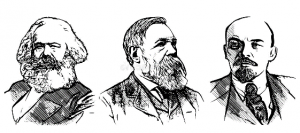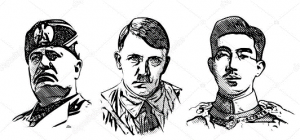Follow the money?


“Follow the money” – a phrase that’s now a part of our national lexicon was popularized by the 1976 film “All The President’s Men.” Forty years later too many of us view this rule for unmasking political corruption as describing how “money rules the world” or “everything is about money.” Thus a widely popular opinion is that the military industry decides on matters of war and peace, not the heads of the states.
This would suggest that Genghis Khan was the puppet of horse breeders and fletchers. The Egyptian Pharaohs were taking orders from the builders of pyramids and chariot makers. That Napoleon invaded Spain in 1808 to satisy the expectations of boot makers or other contractors supplying his army. Imagine Adolf Hitler submitting himself to anybody.
In reality, power is the goal, the only goal, everything else, whether that be money or fame, will follow. How to gain power, how to expend power, and how to stay in a position of power is the first consideration for many. To gain power they need people who will support them, they need followers and those followers need a reason, a motive to follow.
Prior to the Industrial Revolution, military skills, abilities, and talents were the primary means of elevating people into position of power. Thomas Newcomen developed first commercially successful steam engine in 1712, which was improved in 1764 by James Watt, and by the 19th century it powered factories, replaced sailing ships with paddle steamers, and steam locomotives operated on railways. The arrangement of society changed significantly, new classes, the bourgeoisie – wealthy capitalist class and the proletariat – working class became dominant.
In this environment, risking live, shedding blood, and proving yourself on the battlefield were not necessary to climb up the social ladder. Two German philosophers, political theorists, social scientists and journalists, Karl Heinrich Marx and Friedrich Engels, devised a vehicle which could take them to the top, the international Communist revolution. Built on the idea of social justice, a world without rich and poor people, living in a world without wars, in a peaceful community. This concept rapidly spread through academia all over the world.
In 1848 the Communist League, an international secret society, attempted to spark revolution across Europe, but Europe was not ready yet. Elimination of the private property and creating a global government was too alien to people at the time, but the idea of government expanding its influence into the economy offering cheap services, the prospect of well-paying government jobs and lucrative contracts seemed acceptable to many, rich and poor. Socialism became the key word for a gradual growth of government control over economy and other aspect of people’s lives. Marx and Engels died without realizing their revolution, but the idea of Socialism survived. In the early 20th Century, Socialism became a reality in different places, forms and under different names reflecting the sentiments of citizens. Classic Socialism quickly transformed Russia into the Communist Soviet Union. Meanwhile Fascism is the name of a socialist systems installed in post WWI Italy, and later Nazism in Germany.
Russia, 1917:
During WW1, on the 1st of February 1917, the Germans initiated an unrestricted submarine assault against the Allied naval blockade which led to the killing of civilian traders, including Americans, paralyzing trade and causing food shortages in cities along the East Coast. The previously neutral United States was forced to enter the war, which endangered the prospects of a German victory against Russia in the east, while ensuring victory for France and Britain in the west at the same time. To relieve some pressure, the Germans sent, through Sweden and Finland in a sealed train, a well-known Russian Marxist, Vladimir Lenin, (the son of Ilya, director of Public Schools district in the Simbirsk) with his wife and thirty others activist, along with necessary resources to start a revolution and remove Russia from the war. In April 1917 Lenin arrived in St. Petersburg in Russia. Shortly before his arrival, due to strikes over food shortages Czar Nicholas II abdicated in March and the country came under the command of a Provisional Government. Lenin arrived promising social reforms and the end of the war, which allowed him to organize factory workers, peasants, soldiers and sailors into the Red Guard, a volunteer paramilitary force. On the night of October 24, 1917, the Red Guard began to take control of key points in the Russian capital: railway stations, telegraph offices and government buildings. On November 8th the Red Guard captured the Winter Palace, the seat of the Provisional Government. Lenin was declared head of the state, and his troops, which supposedly represented the people, adopted the name Bolsheviks “One of the Majority”. This started the so called “Great October Socialist Revolution” which quickly turned into a violent redistribution of wealth and elimination of opposition. Those who didn’t share and support Lenin’s vision of the new government were executed.
Italy, 1922:
Benito Mussolini (the son of Alessandro Mussolini who was an Italian revolutionary socialist activist) was originally an Italian Socialist politician and journalist at the “Avanti!” newspaper. On the brink of the WWI, he realized that for a majority of Italians, proud descendants of the Roman Empire the way of revolutionary nationalism was preferable to orthodox socialism. After the Treaty of Versailles in 1919, Mussolini gathered his fellow war veterans and various fascist (collectivist) groups into the National Fascist Party. The fascists organized into squads, wearing black shirt uniforms, were visible everywhere, and would burn down Communist and Socialist offices. They would also seize control of local governments and threatened to take control of Rome and the federal government through violent force. On the 31st of October 1922, Mussolini was appointed prime minister by King Victor Emmanuel III. After removing all political opposition through his secret police and consolidating power through a series of laws, on January 3rd, 1925, Mussolini declared himself dictator of Italy.
Unfortunately, today, for a significant percentage of people, especially the youth, socialism is seen as desirable, while at the same time they oppose fascism, which is socialism with a capitalist veneer. Fascism replaced the class warfare of Marxism with a focus on “national interest.” Instead of direct control of the economy, fascism indirectly steers the economy by dominating private owners by forcing them to support the “national interest” which is arbitrarily established by the autocratic authority. Where socialism abolished all market relations outright, fascism left the appearance of free market relations while planning all economic activities behind the scenes.
Both socialist and fascist governments have total control over the monetary system, set all prices and wages politically. In doing this they denatured the marketplace and abolished entrepreneurship. State ministries, rather than consumer needs, determine what is produced and under what conditions. Both systems are destructive, evil in nature, and responsible for the suffering and death of millions.